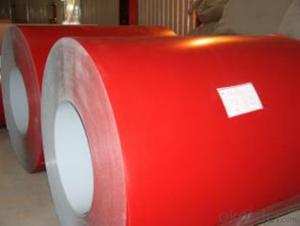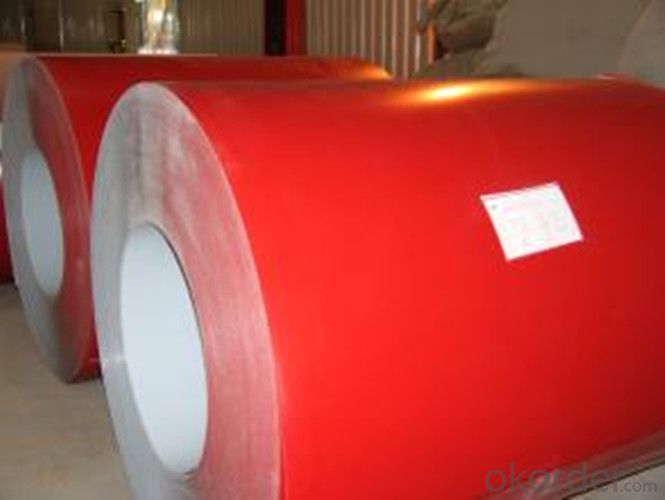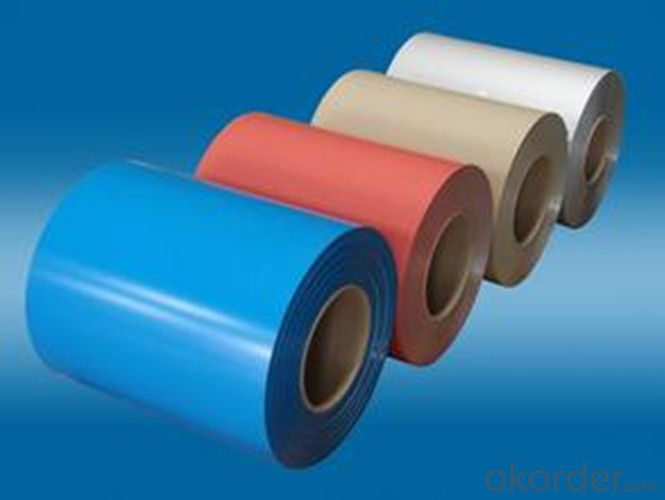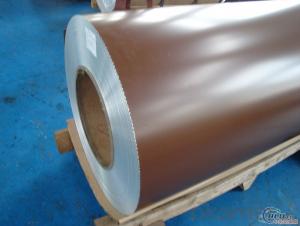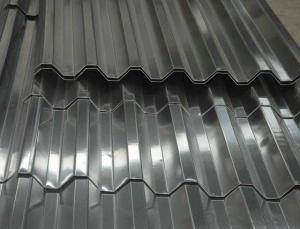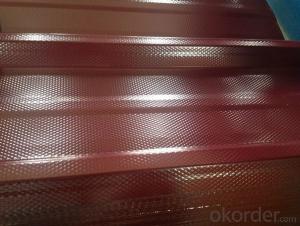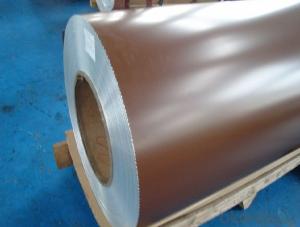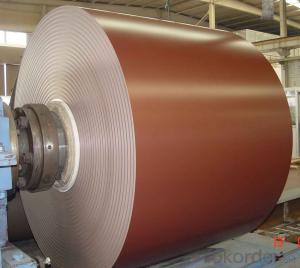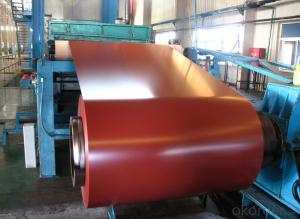3003 Aluminum Coils for Sale - Color Coated Aluminum Roll for Solar Battery Frame
- Loading Port:
- Shanghai
- Payment Terms:
- TT OR LC
- Min Order Qty:
- 5 m.t.
- Supply Capability:
- 50000 m.t./month
OKorder Service Pledge
OKorder Financial Service
You Might Also Like
Specification
Color Coated Aluminium Roll For Solar Battery Frame
Specifications
Grade | 1050,1060,1070, 1100, 1200, 2024,3003, 3004,3005, 3105, 5005,5052 5182,5754,8011 etc |
Thickness | 0.1~1.5mm |
Width | 100~2500mm |
Surface Treatment | PVDF and PE coated |
Temper | O-H112 |
Hardness | More than 2H |
Yield(≥MPa) | 160 |
Ultimate Strength(≥MPa) | 175 |
Elongation(≥%) | 6 |
Packing Material | Moisture-proof agent, steel tape bundle, wooden pallet, brown paper |
Method | Vertical(eye to sky) or horizontal(eye to wall) |
Standard Specification | 1000mm×C, 1200mm×C, etc |
Shipping | Container Loading or Bulk Pack |
Application
1) Construction material further processing
2) Solar cell frame, solar battery frame
3) Glass curtain wall frame
4) Interior decoration
5) Elevator decoration
6) Signs, nameplate, bags making.
7) Automobile parts material
8) Office and Household appliances: HVAC equipments
9) The consumer electronics: mobile phones, digital cameras, MP3 .etc.
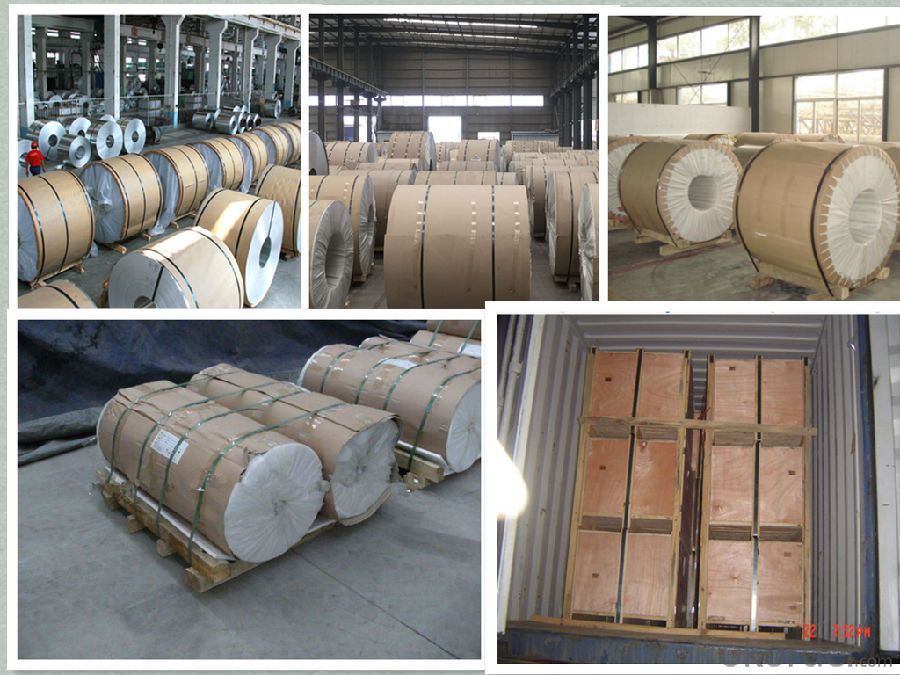
Coating varieties
Polyester Coatings (PE)
PE (polyester) coatings exhibit an excellent combination of hardness, flexibility, flow, appearance, and superior resistance to dirt retention in indoor and outdoor applications. These coatings are highly resistant to abrasion, metal marking, staining, and marring, and require minimal maintenance. Glazetech uses polyester paints which provide excellent colour and gloss retention properties.
Polyvinylidene Fluoride Coatings (PVDF)
PVDF (polyvinylidene fluoride) is a chemical resistant thick film barrier coating commonly used in architectural applications where both excellent appearance and substrate protection must be maintained over a long period of time. This coating is unaffected by most chemicals and solvents and has excellent wear and abrasion resistance. PVDF also has a high dielectric strength, excellent resistance to weathering and the ability to self extinguish.
FAQ
--Q: Do you provide free samples?
--A: Yes, free samples will be sent to you on freight at destination.
--Q: Can I get your latest products catalogue?
--A: Yes, it will be sent to you in no time.
--Q: What is the MOQ?
--A: 2 tons
--Q: What are your payment terms?
--A: We accept L/C, T/T.
--Q: What kinds of alloy can you supply?
--A: 1000 series: 1050, 1060, 1070, 1100, 1145, 1200
3000 series: 3003, 3004, 3105, 3104
5000 series: 5052, 5083, 5754, 5182
6000 series: 6061, 6063, 6062, 6063
8000 series: 8011, 8021
--Q: What’s the coating of top side?
--A: PVDF and PE coating
--Q: What kinds of temper can you supply?
--A: O-H112: O,H12,H14,H16,H18,H22,H24,H26,H,32,H34,H111,H112, T3, T4, T6
- Q: What are the rules or laws governing the use of aluminum coils?
- <p>Yes, there are regulations on the use of aluminum coils, which vary by country and industry. These regulations often pertain to safety, quality standards, and environmental impact. For instance, in the construction industry, aluminum coils used for roofing or cladding must meet specific standards for strength and durability. In food packaging, regulations may dictate the type of aluminum alloys used to prevent contamination. Additionally, there are environmental regulations that govern the disposal and recycling of aluminum coils to minimize their impact on the environment. Compliance with these regulations is crucial for manufacturers, suppliers, and users of aluminum coils to avoid legal penalties and ensure public safety.</p>
- Q: What is the shelf life of aluminum coils?
- The shelf life of aluminum coils may differ based on a variety of factors, such as storage conditions, handling, and the specific alloy employed. Provided they are stored correctly, aluminum coils can generally remain usable for several years. To maintain their longevity, it is advisable to store them in a dry and clean environment, keeping them away from moisture, extreme temperatures, and corrosive substances. Moreover, one should handle them with caution to avoid any harm or contamination that might decrease their shelf life. It is also crucial to carry out regular inspections and maintenance to ensure the integrity and endurance of the aluminum coils. Ultimately, for more accurate information regarding the specific shelf life of aluminum coils, it is recommended to refer to the manufacturer's guidelines or consult a professional in the industry.
- Q: Are there any environmental benefits to using aluminum coils?
- Yes, there are several environmental benefits to using aluminum coils. Firstly, aluminum is a highly recyclable material, meaning that it can be reused multiple times without losing its quality. This reduces the need for extracting and processing new raw materials, saving energy and reducing carbon emissions. Additionally, aluminum coils are more lightweight compared to other materials, reducing transportation fuel consumption and associated greenhouse gas emissions. Moreover, aluminum has a longer lifespan, making it more durable and reducing waste generation. Overall, using aluminum coils contributes to a more sustainable and eco-friendly approach in various industries.
- Q: Are aluminum coils suitable for architectural roofing systems?
- Architectural roofing systems can indeed make use of aluminum coils. The popularity of aluminum as a roofing material stems from its many advantages. To begin with, aluminum is lightweight, making it easy to handle during installation and decreasing the burden on the building's structure. Furthermore, aluminum is highly durable and resistant to corrosion, ensuring that it will last for a long time as a roofing option. Its exceptional thermal properties are worth noting as well, as it can reflect heat and lead to reduced energy consumption. Another advantage is the ease with which aluminum coils can be molded and shaped into various profiles and designs, allowing for flexibility in architectural styles. Lastly, aluminum is an environmentally friendly choice for roofing systems, as it is both recyclable and sustainable. In conclusion, aluminum coils are a practical and suitable choice for architectural roofing systems, offering durability, versatility, and energy efficiency.
- Q: The question asks if magnetic induction can be used to inspect the quality of an aluminum coil.
- <p>No, you cannot use magnetic induction to inspect the quality of an aluminum coil. Magnetic induction is a method used to detect flaws or discontinuities in ferromagnetic materials, such as steel, by inducing eddy currents. Aluminum is not a ferromagnetic material, so it does not retain magnetism or support the formation of eddy currents in the same way. Instead, other non-destructive testing methods like ultrasonic testing or radiographic testing may be more appropriate for inspecting the quality of aluminum coils.</p>
- Q: You guys may be thinking, why the hell i posted this in the computer section. Well, I'm opening my computer, and I hate the anti-static wristbands. I know that by touching metal, you can get rid of all static electricity in your hands. Can you do this by touching aluminum foil? Since it's something everyone should have in their house.. Can it work like this?
- Yes most kinds of metal would work.
- Q: What are the common surface preparation methods for aluminum coils?
- Common surface preparation methods for aluminum coils include cleaning, degreasing, and etching. Cleaning is typically the first step in the surface preparation process for aluminum coils. This involves removing any dirt, dust, or other contaminants from the surface. Cleaning can be done using a variety of methods, such as using solvents, alkaline cleaners, or mechanical cleaning techniques like brushing or scrubbing. Degreasing is another important step in preparing aluminum coils. This helps to remove any oils or greases that may be present on the surface. Degreasing can be done using solvents or alkaline cleaners specifically designed for this purpose. It is essential to thoroughly remove any grease or oils, as they can interfere with subsequent treatments and coatings. Etching is often performed on aluminum coils to create a roughened surface, which improves adhesion for subsequent coatings or treatments. Etching can be done using chemical etchants or through mechanical methods such as sandblasting. The choice of etching method depends on the specific requirements of the application and the desired surface finish. After surface preparation, additional treatments may be applied to aluminum coils, such as conversion coatings or anodizing, to enhance corrosion resistance or improve surface properties. These treatments help to protect the aluminum surface and provide a base for further finishes or coatings. Overall, proper surface preparation is crucial for achieving good adhesion, corrosion resistance, and overall performance of aluminum coils in various applications. It ensures that the surface is clean, free from contaminants, and properly prepared for subsequent treatments or coatings.
- Q: What are the maximum and minimum coil weights available?
- The specific type of coil being referred to can cause variations in the available maximum and minimum coil weights. When considering electrical coils, such as those utilized in transformers or motors, factors like wire size, material, number of turns, and intended application determine the maximum and minimum coil weights. Manufacturers generally set weight limits on these coils, which can range from small and lightweight to large and heavy. For instance, a small coil may have a maximum weight of a few grams, while a larger coil could weigh several kilograms. To ascertain the maximum and minimum coil weights for a specific application, it is essential to consult the manufacturer or supplier's specifications.
- Q: Is it safe or effective to use a hot plate for heating an aluminum coil?
- <p>Yes, you can use a hot plate to heat an aluminum coil, but with caution. Aluminum is a good conductor of heat, so it will heat up quickly. Ensure that the coil is clean and free from any residues that might cause uneven heating or damage. Monitor the temperature closely to prevent overheating, as aluminum can warp or melt at high temperatures. Use a heat-resistant surface or a heat diffuser to distribute the heat evenly and protect the hot plate surface. Always follow safety guidelines and manufacturer recommendations for both the hot plate and the aluminum coil.</p>
- Q: What precautions should we take to maintain health while using aluminum coils?
- <p>To protect our health when using aluminum coils, it's important to ensure that the coils are used in a manner that minimizes the release of aluminum into the environment or food. This can be achieved by avoiding high heat, as aluminum can leach more easily into food at high temperatures. Use aluminum coils in well-ventilated areas to minimize inhalation of fumes. Additionally, it's crucial to clean the coils properly to remove any residue that could contain aluminum. Regularly inspect the coils for any signs of wear or damage, as this can increase the risk of aluminum exposure. Finally, consider using alternatives to aluminum coils, such as stainless steel or cast iron, which are less likely to release harmful substances.</p>
Send your message to us
3003 Aluminum Coils for Sale - Color Coated Aluminum Roll for Solar Battery Frame
- Loading Port:
- Shanghai
- Payment Terms:
- TT OR LC
- Min Order Qty:
- 5 m.t.
- Supply Capability:
- 50000 m.t./month
OKorder Service Pledge
OKorder Financial Service
Similar products
Hot products
Hot Searches
Related keywords
